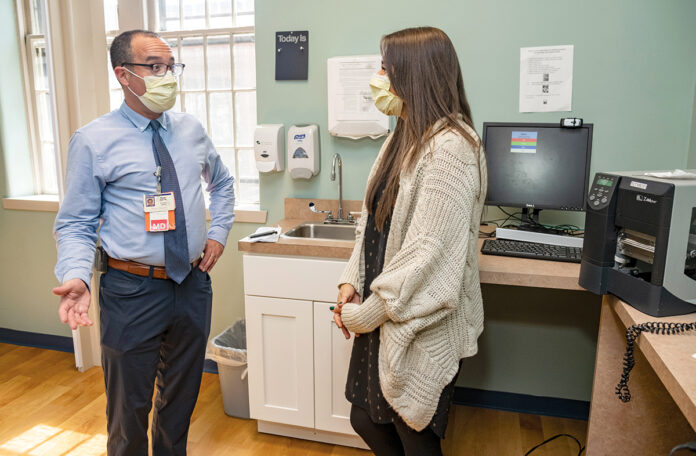At the height of the COVID-19 pandemic, telemedicine was hailed as a lifesaver, allowing patients to see their doctor virtually without the risk of catching or spreading the virus in a medical office.
Now, it’s getting a little more complicated.
That’s because some states that were lenient during the pandemic are reining in cross-border telemedicine, prohibiting doctors in one state from teleconferencing with patients who live in another unless the doctor is licensed in both states. In some cases, doctors conducting cross-border telehealth visits risk being sanctioned.
In a small state such as Rhode Island, where residents may have a doctor across a state line or where a doctor may have patients who live close by in another state, telemedicine can be particularly tricky if doctors aren’t licensed in both places. In telemedicine, the patient’s location, rather than their doctor’s, dictates the legally recognized site of care.
“We’re a small state in a region of small states,” said Dr. James McDonald, medical director of the R.I. Department of Health. “In order to have the actual practice of medicine, you really need to just be able to talk to your doctor. ... You need to meet patients where they are a little bit.”
For this reason, the department opted to allow out-of-state providers to see patients in Rhode Island via telemedicine visits – a measure that McDonald said has been in place prior to the pandemic.
“The key point there was a continuity of care,” McDonald said, so with “an established relationship” between a patient and a provider, “we had no concerns.”
‘We’ve had a lot of discussion about the impact of out-of-state orders.’
DR. KEVIN BAILL, Bulter Hospital associate chief medical officer
While Rhode Island’s health department remains tolerant about licensing, Massachusetts has returned to pre-pandemic stringency, to some physicians’ vexation.
“Massachusetts was really the big issue for us,” said Dr. Peter Hollmann, chief medical officer of Brown Medicine and a board member of the Rhode Island Medical Society.
“We were not worried that the R.I. Department of Health would cite Peter Hollmann for talking to a patient in Seekonk,” he said, “but the concern would be whether [the Massachusetts] licensure board, their medical authority would come after Peter Hollmann for practicing without a license in Rhode Island.”
The most likely repercussions doctors risk would be having a complaint filed against them with their own medical board, according to Hollmann, resulting in a fine, suspension or educational measures. In extreme cases, Hollmann said states might try to enact criminal sanctions.
Dr. Kevin Baill, associate chief medical officer for Butler Hospital, also expressed concern with Massachusetts regulations.
“We’ve had a lot of discussion about the impact of out-of-state orders, especially for Massachusetts,” Baill said. “And we have a lot of patients who are out of state but access our services.”
Butler, a behavioral health and psychiatric care hospital, often works with patients who don’t always need face-to-face interactions, Baill said. With some therapies, such as group meetings, videoconference calls have helped to alleviate space limitations.
Some providers opt for multistate licensure to continue seeing out-of-state patients via telehealth.
Massachusetts has enacted “various flexibilities” and “a streamlined process for out-of-state physicians to obtain a Massachusetts license” if they wish to continue seeing out-of-state patients via telemedicine, according to a spokeswoman for the Mass. Executive Office of Health and Human Services.
But multistate licensure is not feasible for all providers, Baill said. Becoming licensed is a “fairly long and expensive process.” Applying for a Massachusetts medical license can take months and maintaining an out-of-state license can cost providers more than $1,000 for four years.
“It isn’t something that’s sustainable if there’s only going to be a small number of patients that get served,” Baill said.
Rhode Island saw a 50% increase in physicians licenses issued from 2015 to 2020 and another significant increase in 2021, according to McDonald. He largely attributes this jump to the increasing use of telemedicine, noting that about 1 in 6 physicians licensed in Rhode Island have an out-of-state home address.
Even under Rhode Island’s telemedicine allowances, administrators at Brown Emergency Medicine – which along with Brown Medicine is part of Brown Physicians Group Inc. – were not comfortable accepting out-of-state patients via telehealth due to concerns of a legal risk.
When the Brown Emergency Medicine TeleCARE System was launched last winter, “we never did allow our providers to take care of patients from out of state unless they were licensed in the state in which the patient was present,” said Dr. Gary Bubly, an emergency physician and senior director for business development at Brown Emergency Medicine.
“We were starting a novel service, and our risk management folks were being very conservative about testing the waters,” Bubly said.
But not all doctors are as stringent about following out-of-state telehealth licensure rules, Bubly noted, adding that he sees value in relaxing telemedicine licensure standards beyond state borders.
“If I go to California next week, am I better off calling my primary care provider with a problem from California, or going to a doctor I don’t know?” Bubly asked.
“Some of these rules, they’re well-intentioned because they’re trying to ensure quality of licensure providers,” he added, “but in that case, my provider would probably cover those needs better and provide better, safer care via telemedicine.”
In 2013, state medical boards, working with the Federation of State Medical Boards, created the Interstate Medical Licensure Compact, a network of 30 states, Washington, D.C., and Guam offering “a voluntary, expedited pathway to licensure for physicians who qualify.” While individual states still grant the licenses, physicians complete one common application for licensure in any member states.
Hollmann doesn’t see a national licensure program gaining traction but hopes to see states adopt policies that prioritize continuity of care, like Rhode Island’s model.
While telemedicine usage has decreased since the early days of the pandemic, providers anticipate some demand for the service is here to stay. In July, Rhode Island adopted legislation that permanently maintains certain telemedicine measures extended during the pandemic.
With this anticipated longevity, some hope for more accessibility to practicing telemedicine across state borders.
“At least within our state, we’re operating as if telehealth and remote treatment is here to stay,” Baill said. “It would be ideal for us if that were true beyond our state borders, if that could be true for all providers around the country.”
Jacquelyn Voghel is a PBN staff writer. Email her at Voghel@PBN.com.












